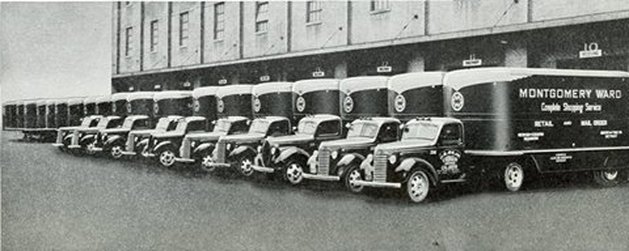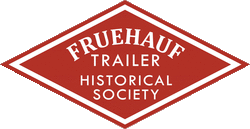- The Fruehauf Trailer Historical Society - Home
- Bookstore & Gift shop
- Classic Trailer Types
- Company History early years
- Company History - Later years
- Fruehauf Inventions and Patent List
- Military Defense Vehicles
- The Fruehauf Family
- Who Really Invented the Shipping Container?
- What Happened to the Fruehauf Trailer Company?
- The Internal Struggle for Power
- Singing Wheels and other movies
- Author's News Blog
Singing Wheels gets a nice review in Today's Trucking by Rolf Lockwood's The Lockwood Report5/14/2013 See full article - click here
Contrary to what my daughters seemed to think when they were about five years old, I don't know everything. That will come as a surprise to absolutely nobody amongst you out there in Readerville, of course, but the girls would have argued my case vehemently 15 or 20 years ago. It's one of the joys of fatherhood, maybe the biggest of them all, that notion of Dad being infallible and omniscient. For a while, and then it changes. But I digress before I've started. The point I wanted to make is that I still learn stuff every day, sometimes big stuff. As I've been doing these last few days while reading the history of the Fruehauf Trailer Co., once utterly dominant on the U.S. trailer scene and more or less the same in Canada. That historical treat comes from Ruth Fruehauf, daughter of Roy Fruehauf, who was president of the Detroit-based giant from 1949 to 1962, and granddaughter of the company founder August Fruehauf. She's built a website dedicated to the company's history -- www.singingwheels.com -- and is writing a book to go along with it. I've had a little correspondence with Ruth over the last few days, and while it's clear she no longer sees her late father and grandfather as infallible, it's equally clear that she's proud of her heritage. Without, I'm glad to say, feeling the need to cover up some of the warts that troubled both the family and the company over its final years and ultimately brought the enterprise down in 1996. As corporate histories go, this one is especially interesting. Among the things I've learned tonight is that there's one more key moment in trucking's own tale than I thought. And that's the shift from truck-borne to trailer-borne freight. So obvious, I suppose, that I didn't give it the significance it deserves Fruehauf was smack in the middle of the huge switch from horses and wagons to trucks in the early years of the last century, having started as a Detroit blacksmith shop in 1899, ultimately in a bigger and better shop with 60 bays, meaning space for 60 horses, at its zenith in 1912. The first Fruehauf trailer came during that period when a wealthy Detroiter asked August to create the means by which his boat could be hauled to an inland lake, a trip too long for horses, behind his Ford Model T car. The first trailer -- a lumber hauler-- to be pulled by a 'proper' commercial truck came in 1914. That's the first of the trucking industry's key moments, of course. Then there was the truck's use in war, part of the same moment really, starting in 1914. From that point until the early 1950s trucks obviously took over the local freight-hauling business but longer hauls were largely rail territory. That said, a growing number of very small outfits -- usually one-truck owner-operators -- gradually began doing longer trips, as far as the primitive road system would allow. And much more primitive in Canada than in the U.S. If you've ever seen 'They Drive by Night', by far my favorite trucking film of all, you'll know a little about those early over-the-road guys. Made in the late '40s and starring George Raft and Humphrey Bogart as a pair of owner-ops trying to make a living with what we'd now call a straight truck, it oozes realistic of somewhat romantic grit. And the issues they face aren't much different from those of 2013. If you haven't seen it, launch a search right now. But I digress again. In the early 1950s, and the significance of this switcheroo is what I've been miscalculating all these years, Raft and Bogart would likely have migrated to a truck and a trailer. It made a trucking buck easier to come by because it brought efficiencies. And the emergence of the trailer was instrumental in killing the stranglehold the railways had on the long-haul freight business. Fruehauf, of course, was smack in the middle of this shift too. In a terrific article from 'Sales Management' magazine in December of 1951, published somewhere in the U.S. and replicated on the Singing Wheels website, Fruehauf's role in the industry was very well explained. A marketing magazine, it noted that the trailer manufacturer's sales in that year reached US$160 million and it had 8500 employees. Pretty big. At that point, the article noted, there were 8.5 million commercial trucks on U.S. roads but only 500,000 trailers. Nonetheless, "...with the help of trailers, 15% of the trucks already haul 85% of the tonnage," the article tells us. "While getting more truck operators to 'graduate to trailers,' Fruehauf is making the graduation more worthwhile to trailer capacity, strength and efficiency. It has introduced stainless steel bodies and nailable steel floors: new light metals such as aluminum and magnesium, and new light truck bodies. When conditions permit it will make smaller trailers for lighter-weight trucks." In other words, Fruehauf was instrumental in engineering the transition from rail to truck for all but the heaviest, most awkward, and least time-sensitive freight. And the company did so by way of spending big money on research and marketing the trailer idea. Also by innovation and by creating almost any kind of trailer its customers wanted. There was even a TOFC -- trailer on flatcar -- intermodal idea that became a reality back then. It was an interesting van trailer with a demountable bogie. The trailer would be backed up to the flatcar at a 90-degree angle until its axle dropped off and it engaged a mount on the rail car and was locked into place. A swivel mount on the rail car then allowed the trailer to be pushed into the straight-ahead position. Ingenious. Despite that TOFC idea, the war between rail and road had been well and truly launched, and more than 60 years later, things haven't really changed much at all. I could go on here but there are other things I must write about so I'll leave Fruehauf and urge you to look at Ruth's website for more fun and fascinating stuff. I'd better finish by noting that the end finally came in 1996 when Fruehauf filed for bankruptcy and was bought the following year by Wabash. In its latter years the company was rife with controversy but its contribution to our industry was more than a little significant. I'm left wishing there were more Ruth Fruehaufs to chronicle the early days of trucking and our path from then to now.
0 Comments
|
The advancement of transportation accelerated the economic growth of all industries in the industrial booming United States. The Fruehauf Trailer Company contributed to the advancement of American industry.AuthorsRuth Ann Fruehauf and Darlene Norman have dedicated hard work, determination and intuition to bringing this project to life. This is the ongoing investigation and reporting of their efforts.
Click on the names above for biographical information on our authors. Archives
January 2018
Categories |
PLEASE CLICK ON TITLES WHICH ARE HYPERLINKED TO OTHER TOPICS
Home - Company History-EARLY - COMPANY HISTORY - LATER - CLASSIC TRAILERS - THE 5TH WHEEL - - MARTIN
ROCKING - FRUEHAUF INVENTIONS - MILITARY - SHIPPING CONTAINER - MALCOLM MCLEAN - What Really
Happened - Internal struggle for Power - FRUEHAUF IN THE MOVIES - TRAILER PHOTOS - VIEWERS
CONTRIBUTE - News Blog - FRUEHAUF FAMILY - Killarney - Fruehauf airplanes - GLOBAL OPERATIONS STILL
ACTIVE - WHO INVENTED THE MUDFLAP -PRESS FOR SINGING WHEELS - MUSEUM EXHIBITION - Store
We are SocialAn organization dedicated to the preservation of the history of Fruehauf Trailer Company and the Fruehauf family legacy.
The society has created historical books and a traveling exhibit rich with Fruehauf memorabilia and archival materials. Our next book, “Fruehauf, the First Name in Transportation” an in-depth analysis of the company’s history will be published soon. |
Copyright © 2013 -20 by
Ruth A. Fruehauf and Darlene Norman. All rights reserved. |
- The Fruehauf Trailer Historical Society - Home
- Bookstore & Gift shop
- Classic Trailer Types
- Company History early years
- Company History - Later years
- Fruehauf Inventions and Patent List
- Military Defense Vehicles
- The Fruehauf Family
- Who Really Invented the Shipping Container?
- What Happened to the Fruehauf Trailer Company?
- The Internal Struggle for Power
- Singing Wheels and other movies
- Author's News Blog


 RSS Feed
RSS Feed
